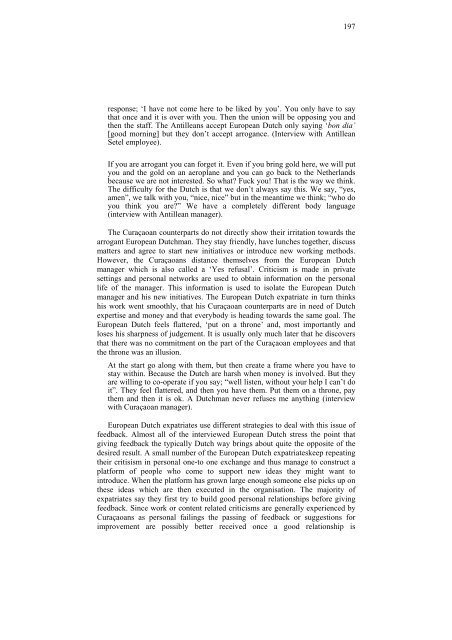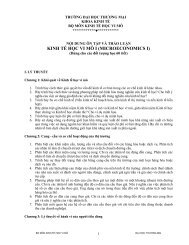- Page 3 and 4:
iiiINTERNATIONALISATION,COOPERATION
- Page 5:
1CONTENTSPreface 7Glossary 8List of
- Page 8:
47.2 Managing Cultural Diversity in
- Page 11 and 12:
7PrefaceStudying cultural anthropol
- Page 13:
9UBNWTOUnisource Business NetworksW
- Page 17 and 18:
11 INTRODUCTIONThe study presented
- Page 19 and 20:
cultural strategies. Most literatur
- Page 22:
6share several common characteristi
- Page 25 and 26:
The central question in the third s
- Page 27 and 28:
11within PTT TELECOM. Anthropologis
- Page 29:
Finally, in chapter ten the conclus
- Page 35 and 36:
the way in which societies look at
- Page 37 and 38:
The second perspective on cross-cul
- Page 39 and 40:
23ethnocentrism. This concept as we
- Page 41 and 42:
25members of a group. Ethnic groups
- Page 43 and 44:
27experiences to produce individual
- Page 45 and 46:
usiness than their American counter
- Page 47 and 48:
The concept of a culture with an un
- Page 49 and 50:
33which control is very difficult,
- Page 51 and 52:
35different forms of globalisation
- Page 53 and 54:
link distant localities in such a w
- Page 55 and 56:
39Well, sometimes I think the idea
- Page 57 and 58:
41strategy offers a clear organisat
- Page 59 and 60:
43competitor. (2) The management cu
- Page 61 and 62:
cooperation between three Dutch dev
- Page 63 and 64:
47industry. Exploration of the tele
- Page 65 and 66:
49support and obtained free access
- Page 67 and 68:
justice to the holistic character o
- Page 69 and 70:
53village community of the Westland
- Page 71 and 72:
55anthropologists tend to study ecc
- Page 73 and 74:
advisors do this in a much shorter
- Page 75 and 76:
59changed. The freedom of publishin
- Page 77 and 78:
61To provide feedback to the object
- Page 79 and 80:
63Preliminary investigation in the
- Page 81 and 82:
653.5 Internal and External Validit
- Page 83 and 84:
67experience also difficulties in i
- Page 85:
69PART IITHE CONTEXT
- Page 88 and 89:
72Technological innovations, which
- Page 90 and 91:
74create their own global private n
- Page 92 and 93:
76strategies to restructure and to
- Page 94 and 95:
78From an idealistic model perspect
- Page 96 and 97:
80telecom market can be divided int
- Page 98 and 99:
82of the most important consequence
- Page 100 and 101:
84TISA that increasingly contribute
- Page 102 and 103:
86the domestic countries of the PTO
- Page 104 and 105:
88Telecom. The non-European activit
- Page 106 and 107:
90be very successful in Latin Ameri
- Page 108 and 109:
92internationalisation that exclude
- Page 110 and 111:
94possible for all Dutch citizens,
- Page 112 and 113:
96three objectives could be reached
- Page 114 and 115:
98With the privatisation the diffic
- Page 116 and 117:
100To execute these strategies and
- Page 118 and 119:
102defined the desired characterist
- Page 120 and 121:
104departments and pieces of a jigs
- Page 122 and 123:
1062,229 people in 16 countries (An
- Page 124 and 125:
108department also meant dealing wi
- Page 126 and 127:
110telecom markets. KPN employees
- Page 128 and 129:
112International Support consists m
- Page 130 and 131:
114The focus of this training is on
- Page 132 and 133:
1166 THE INDIVIDUAL STRATEGIES OF K
- Page 134 and 135:
118The train is full of people who
- Page 136 and 137:
120on the non-stop KLM flight KL 25
- Page 138 and 139:
122colleague, a couple of years you
- Page 140 and 141:
124project therefore needs to be co
- Page 142 and 143:
126decided to ask the new Czech pro
- Page 144 and 145:
128position every 1.3 years while V
- Page 146 and 147:
130reflects the taboo that an emplo
- Page 148 and 149:
132does get caught in the traffic j
- Page 150 and 151:
134organisation to promote the proj
- Page 152 and 153:
136KPN is a very political organisa
- Page 154 and 155:
138The fear of losing their jobs as
- Page 156 and 157:
140carries a suitcase containing a
- Page 158 and 159:
142learnt from previous experiences
- Page 160 and 161:
144
- Page 162: 146
- Page 165 and 166: 149Telecommunication Provider’. H
- Page 167 and 168: 151fair in Geneva. 49 The strategic
- Page 169 and 170: 153UnisourceCarrierServicesFigure 1
- Page 171 and 172: 155In order to create synergy withi
- Page 173 and 174: 157communicate with and they are ab
- Page 175 and 176: 159In this rivalry cultural differe
- Page 177 and 178: 161and the relevant persons have si
- Page 179 and 180: 163colleagues. There seems to be a
- Page 181 and 182: 165‘Everywhere in the world the s
- Page 183 and 184: 167Spanish employees do not speak E
- Page 185 and 186: 169own cultural identity. Olving (1
- Page 187 and 188: 171this, yes I want this done’. T
- Page 189 and 190: 173American telecom market is furth
- Page 191 and 192: 175There is exaggerating compassion
- Page 193 and 194: 177The business hours in Unisource
- Page 195 and 196: 179moved to Spain together with the
- Page 197 and 198: 181formally understood the competit
- Page 199 and 200: 1838 UNSUCCESSFUL CROSS-CULTURAL CO
- Page 201 and 202: 185The colonial relationship with t
- Page 203 and 204: 187Siemens machine out of there, bu
- Page 205 and 206: 189international activities. The ac
- Page 207 and 208: 191In the light of these observatio
- Page 209 and 210: 193gets into his white Toyota. Slow
- Page 211: 195With the new CEO of Setel, consu
- Page 215 and 216: 199It is thus not difficult to imag
- Page 217 and 218: 201the order at the front desk hims
- Page 219 and 220: 203addition to holding their offici
- Page 221 and 222: 205first reconstructed the network
- Page 223 and 224: 207live in expensive expatriate sub
- Page 225 and 226: 209company Werkspoor BV, which was
- Page 227 and 228: 211afraid of the growing domination
- Page 229 and 230: 213internationalisation and its cro
- Page 231 and 232: 215divided. 78 The decentralisation
- Page 233 and 234: 217they were the product of a small
- Page 235 and 236: 219loss of the participation was th
- Page 237 and 238: 221track end. The situation was muc
- Page 239 and 240: 223Kumpra nos patrimonioBendemi, be
- Page 241 and 242: 225Perceiving Curaçao as Dutch ter
- Page 243 and 244: 227Dahoko, who now works for the KP
- Page 245 and 246: 229private companies is through Ker
- Page 247 and 248: 231Dutch, we are forgiving, our rel
- Page 249 and 250: 233KPN had learned from its experie
- Page 251 and 252: 235and listen to their stories, exp
- Page 253 and 254: 237It is only ten kilometres to the
- Page 255 and 256: 239colleagues and talk about small
- Page 257 and 258: 241For the Dutch who speak Bahasa I
- Page 259 and 260: 243While Indonesians tend to see KP
- Page 261 and 262: 245an important role in Indonesia (
- Page 263 and 264:
247Personally, I tend to pipe down
- Page 265 and 266:
249country’s people. Java has alw
- Page 267 and 268:
251the Citra Graha building to pray
- Page 269 and 270:
253the breaking of the fast at abou
- Page 271 and 272:
255From their own perspective they
- Page 273 and 274:
257finally reach an agreement after
- Page 275 and 276:
259manage her housekeepers, how to
- Page 277 and 278:
261The activity Leo likes most is s
- Page 279 and 280:
263have a good relationship with al
- Page 281 and 282:
265from the TNT Post Group. This co
- Page 283 and 284:
267however, stimulates the selectio
- Page 285 and 286:
269PART IVCONCLUSIONS
- Page 287 and 288:
27110 CONCLUSIONS AND IMPLICATIONST
- Page 289 and 290:
273Which strategies of cross-cultur
- Page 291 and 292:
275dependency of the Antillean econ
- Page 293 and 294:
277Indonesian government connected
- Page 295 and 296:
279behaviour and actions of the ind
- Page 297 and 298:
281In summary, the change in the or
- Page 299 and 300:
283Uncertainty avoidance 53 48Mascu
- Page 301 and 302:
285strategies. The lengthier and mo
- Page 303 and 304:
287anthropological corporate resear
- Page 305 and 306:
289international expansion of Weste
- Page 307 and 308:
291diversity in professional cultur
- Page 309 and 310:
293own work situation participants
- Page 311 and 312:
295⋅Develop a cultural and politi
- Page 313 and 314:
297Caby, L. and C. Steinfield (1994
- Page 315 and 316:
299Koot, W. (1994). Ambiguïteiten
- Page 317 and 318:
301Putten, E.J. van der (1996). Een
- Page 319 and 320:
303Annex IIn the contract the durat
- Page 321 and 322:
305Step IIObjectiveExploring the Du
- Page 323 and 324:
307December 1995 till December 1997
- Page 325 and 326:
309between the Netherlands Antilles
- Page 327 and 328:
311The newspaper Jakarta PostResear
- Page 329 and 330:
313wordt een tweetal afdelingen ges
- Page 331 and 332:
315In dit hoofdstuk wordt de contex
- Page 333 and 334:
317om met de nieuwe internationale
- Page 335 and 336:
319makamba’s (Nederlanders) (schu
- Page 337 and 338:
321zakenrelaties, familie relaties
- Page 339:
323Curriculum VitaeAlfons van Marre




